Rural Water Supply Network
Nouvelles
Total Results: 20 • Page 4 sur 5
RWSN rated a top WASH non-profit for 2015!
25.03.2015
A survey of 81 WASH experts by charity navigation website, Philanthropedia, has placed RWSN 7th in the list of most effective non-profit organisations - and the top network. It is also great to see that most of the other organisations are either RWSN Executive Committee members (WaterAid, IRC, UNICEF), RWSN Member Organisations (World Vision, Water for People) or have an active individual members of the network.
The summary of the experts opinion on RWSN includes:
Evidence of Impact Summary:
Experts respect RWSN as a forum for discussion for 6,000 water professionals; a setting for knowledge exchange and networking. The RWSN is also useful as a resource that allows its member organizations to view the best practices of peer organizations and adopt them in their own. RWSN also provides guides to its member organizations providing tips regarding development. "
Organization Strengths Summary:
The Rural Water Support Network, due to the breadth of its supporters, is highly esteemed in the field of WASH and its nonpartisan nature is valued. They also have been able to bring different stakeholders together for fruitful dialogue.
There are also some recommendations on how we can improve, which is helpful, and we look at how to address those.
Website Updating site Web Actualisation
16.01.2015
Following your feedback, we are improving the navigation of this website so that it is easier for you to find information on topics that are of most interest to you. As we implement new features or layout you may notice some changes - thanks for your patience as we get this sorted..
Self-supply is now rolling out on a large scale in Ethiopia l’auto-approvisionnement se répand maintenant à une large échelle en Ethiopie
19.12.2014
Within the Millennium Water Alliance project practical Self–supply training was conducted in Ethiopia by IRC in the framework of the implementation of the ONE WASH strategy. Various options for business models are being evaluated and supply-chains strengthened. IRC published guidelines on how to develop Self-supply action plans. Other international partners include the African Development Bank who support the Ethiopian government in improving and monitoring Self-supply. More information on training and documentation: Lemessa Mekonta at [mekonta @ ircwash.org] or John Butterworth [butterworth @ ircwash.org]
Essential reading for any organisation installing handpumps in DRC Est-ce que votre organisation a installé des pompes manuelles dans l’est de la RDC? Une étude met en exergue la nécessité d’améliorer les services d’eau plutôt que le nombre de projets d’eau
09.12.2014
A new report, commissioned by UNICEF “Supply chain analysis of handpumps and spare parts in Eastern Democratic Republic of Congo” by A-aqua and Fontes Foundation found many failed handpump projects by NGOs, UN Agencies and government because: “Usually, no spare parts ordered together with handpumps by implementing actor”; “No market for spare parts because handpumps are ordered outside the locally established market”; “Lacking or only incomplete training of hand pump mechanics”; “No follow up or training after installation of handpump”.
Clean water from good boreholes critical to Ebola response De l’eau propre issue de forages fonctionnels: élément essentiel pour lutter contre Ebola
24.11.2014
Ensuring that medical facilities have sufficient quantities and quality of water is critical as the crisis in Sierra Leone, Liberia and Guinea continues. For those agencies working these areas and who maybe drilling boreholes we strongly recommend that you refer to the RWSN Code of Practice for Cost Effective Boreholes to make sure work is being done to a high quality and a reasonable cost. French versions of all the companion volumes will be available very soon.
GLAAS 2014 – the most important report that you probably haven’t heard of GLAAS 2014 – probablement le rapport le plus important que vous avez jamais vu
24.11.2014
(With thanks to WASH Advocates for their timely email and blog post)
GLAAS is UN-water GLobal Analysis and Assessment of Sanitation and drinking-water. It “provides a global update on the policy frameworks, institutional arrangements, human resource base, and international and national finance streams in support of sanitation and drinking-water.” This sounds boring, but it is important.
In the 2014 GLAAS report there many important general recommendations about lack of funding, dependence on external funding, lack of human resources in the WASH sector and major monitoring gaps, however for rural water supply specifically:
- More can be done to improve WASH in schools and health centres, particularly in rural areas. Only 19 of 93 surveyed countries have national policies on drinking water in schools that are being funded and implemented.
- Only 23% of 93 surveyed countries reported a high level of implementation of measures to keep rural water supplies functioning over the long-term.
- Drinking-water quality surveillance is far greater in urban areas: nearly 70% of countries report surveillance in urban areas compared to only 40% in rural areas.
- Household expenditure for access and use of WASH services in the form of tariffs (i.e. payments to service providers) and self-supply (out-of-pocket expenses) has previously been recognized as a knowledge gap in WASH financing.
- It is acknowledged that some of the 19 surveyed countries are likely under-reporting household contributions, especially in rural areas that may not be served by a formal service provider, and where households may make significant non-monetary investments.
- Rural populations in 19 countries surveyed represent 71% of the unserved, but benefit from only 19% of the expenditures for sanitation and drinking-water. 75% of WASH aid is targeted towards urban areas.
- Basic WASH services receive a lower proportion of overall aid for water and sanitation than for large systems.
- Spending of funds allocated for rural water in 67 countries has increased from 42% in 2011 to 60% in 2013, which is marginally higher than urban water and sanitation (rural and urban). Countries cite procurement and disbursement procedure complexity and delays as the top two reasons for under-utilization of donor commitments, while donors cite limited national capacity and operational delays.
- Less than 25% of WASH aid is targeted towards maintaining existing services.
John Oldfield at WASH Advocates recommends the following:
Nonprofits and implementing agencies:
- Focus more on local government and community capacity-building; on the poorest of the poor (predominantly rural); on sanitation and hygiene as key components of an integrated WASH program; on enabling environments including policy advocacy; on sustainable financial models appropriate to local contexts; on monitoring and evaluation (particularly long after the ribbon-cutting ceremony); and on converting the high levels of political commitment we see in the GLAAS report to tangible country-level action.
- Work alongside or within government (national and local) systems in your program countries rather than in spite of the local government; support those governments' efforts to develop and strengthen their own capacity to monitor and evaluate WASH efforts rather than imposing your own.
Private, corporate, and government funders:
- Think less about how many wells you can buy, and more about how to have a transformative impact in your program countries and communities. Start with a problem, and fund the appropriate solution set, not vice versa.
- Seek out and fund efforts as outlined above; ask your potential US and local grantees tough questions early in the proposal process about technical and financial sustainability and appropriateness. Are you helping to transform a community, or just creating/deepening dependencies?
- Support programs designed to leave behind capacity, not holes. Some of the best/promising initiatives we are following most closely now include: Water For People's Everyone Forever campaign; Water.org's Watercredit ; WASH policy advocacy efforts at various levels, including the Sanitation and Water for All Partnership, End Water Poverty, and the WASH Advocacy Challenge.; Sustainable Service Delivery
- Focus less on the low hanging fruit (e.g. large drinking water projects in dense urban environments) and more on the most difficult people to reach as identified by the GLAAS report (e.g. small rural or per-urban integrated sanitation programs).
- Think beyond the household: fund WASH efforts in healthcare facilities and schools, in part to prevent the next Ebola or cholera outbreak from becoming an epidemic.
WEDC Distance Learning Scholarships available NOW! Water, Engineering and Development Centre (WEDC)
10.10.2014
For the following postgraduate courses starting in January 2015:
PG Certificate in Water and Environmental Management
A four module programme which enables you to develop knowledge, expertise and skills in all aspects of water, sanitation and environmental management.
Course entry requirements
- UK Lower Second Class Honours degree or equivalent
- Recognised English Language qualification, (for example IELTS of 6.5), see:http://www.lboro.ac.uk/international/englang/index.htm
PG Certificate in Water and Waste Engineering
A four module programme which enables you to develop knowledge, expertise and skills in all aspects of sustainable public health infrastructure and services, for all levels of consumer.
Course entry requirements
- UK Upper second class Honours degree or equivalent in a science, engineering or relevant discipline
- Recognised English Language qualification, (for example IELTS of 6.5), see:http://www.lboro.ac.uk/international/englang/index.htm
Realising the human rights to water and sanitation: A Handbook by the UN Special Rapporteur, Catarina de Albuquerque
27.08.2014
The outgoing UN Special Rappporteur on the human right to safe drinking water and sanitation, Catarina de Albuquerque, will be launching her Handbook in Geneva on the occasion of her final reporting session to the Human Rights Council in September.
The Handbook will be launched on 10 September, in Room XXVII at Palais des Nations, Geneva, hosted by The Permanent Missions of Germany and Spain to the United Nations in Geneva and the Office of the High Commissioner for Human Right. Everyone welcome!
The Handbook will simultaneously be made available online, on Catarina's own website: http://www.ohchr.org/EN/Issues/WaterAndSanitation/SRWater/Pages/SRWaterIndex.aspx, and on the righttowater.info website.
There will be second launch in New York at the end of October, and including the launch of Arabic, French, Spanish and Portuguese versions of the Handbook. Dates and times to be confirmed.
For more information contact Virginia Roaf: virginiaroaf@gmail.com or handbook@hr2ws.org
The Politics of Professionalism Word from the Chair
21.08.2014
We are all professionals; you the members of RWSN are rural water supply professionals. You all work for different stakeholders, governments, NGOs or private sector. You all work at different levels: community, local government, national or international cooperation. We all have one thing in common: a professional background and enthusiasm for rural water supply. Some come from a more engineering perspective; some come from a management, social science or governance perspective.
Professionals do not operate in isolation. What happens with rural water supplies is influenced by decision-makers in Ministries, by political leaders, influential leaders at a local level, community organisations and others. Many water supply professionals work in a decentralised environment. Sometime decisions are taken that professionals consider as counterproductive. For example: when funding is not targeted to those in greatest need; or when government is too slow to act, or if political leader promise things that contradict existing policies, plans or approaches. During a training that I facilitated some years ago, an engineer working for the Public Health Engineering department in one of the states in India lamented about: “…when local government talks and decides about things it does not know anything about”.
The balance between professionals and decision-makers is delicate. These people live in different worlds – even using different languages and vocabulary – but they must come together and respect each other’s perspectives and positions. In many countries, professionals in water supply struggle with decision makers and vice-versa.
Cooperation needs to get better: building trust, respecting positions and professional expertise, listening carefully and having the spaces for discussion and exchange. It is the only way – now and then it will be cumbersome and frustrating, but it is the only show in town. Professionalism and politics have to live together. But in the end, and to be honest, it is nice to be a professional and it is good to be proud of the profession and stand up for it; all the rest will follow from understanding and wisdom.
At the World Water Week in Stockholm this year, Stef Smits, representing the RWSN, will present a case on the politics of professionalism. If you are at the conference, come and join this seminar organised by the Sanitation and Water for All (SWA) initiative on Monday 1st September 2014 from 17:45 to 18:45 in Room T2.
Ton Schouten, Chair
Meet the new RWSN Chair: Ton Schouten, IRC Word from the Chair
01.01.2014
It is a great honour to be the chair of the RWSN for the coming three years. It is an honour to take over from Richard Carter and to be in the footsteps of so many other great sector professionals that have chaired the RWSN in the past. It is an honour as well to cooperate with the highly committed secretariat of RWSN hosted by Skat Foundation. It is also quite something to be the chair of a membership organisation that brings together thousands of people from all over the world, working for all kinds of organisations and at many different levels; all sharing the same passion for rural water supply; from different angles and positions, with different interests but sharing that same vision in which people living in villages and small towns rely on a good quality and everlasting water supply. That is a great vision to contribute to.
There are many organisations having that vision. However, there is only one true membership organisation and that is RWSN. I hope to be able to strengthen the sense of membership and stimulate the active participation in RWSN of all members regardless where they work and on what level. For anyone working in rural water supply being a member of RWSN should be self-evident.
Very soon the preparation of the next 3 year RWSN strategy (2015-2017) will start. This will consolidate the thematic areas and activities that have been deployed over the last three years. It aims to strengthen the services to the members and stimulate their active participation. But for now: use the existing RWSN services to increase the quality of your daily work in rural water; share your ideas and experiences in the Dgroups and e-discussions; make RWSN the number one platform for those who put their professional energy in rural water supply day after day; contribute to RWSN being the voice that can speak with authority to governments, donors, external support agencies, knowledge institutes and private companies.
Contributing to a safe and lasting water supply for rural people is one of the nicest things to do and it is great to know that there are thousands of members who think the same!
Ton Schouten
Senior Programme Officer, IRC International Water & Sanitation Centre
Chair of the Rural Water Supply Network
------
===================
LE MOT DU PRESIDENT
===================
C’est un grand honneur pour moi d’être le président du RWSN pour les trois années à venir. C’est un honneur de prendre la suite de Richard Carter et d’être dans les pas de tant de grands professionnels du secteur, lesquels ont présidé le RWSN dans le passé. C’est un honneur également de coopérer avec un secrétariat très engagé, hébergé par la Fondation Skat. C’est aussi quelque chose de présider une organisation d’adhérents qui rassemble des milliers de personnes de partout dans le monde, travaillant pour toute sorte d’organisations et à différents niveaux, toutes partageant la même passion pour l’accès à l’eau en milieu rural, avec des points de vue et des positions différentes mais partageant la même vision selon laquelle les personnes vivant dans les villages et les petites villes doivent compter sur un approvisionnement en eau potable de bonne qualité et qui dure toujours. C’est une grande vision à laquelle contribuer.
Il y a de nombreuses organisations qui partagent cette vision. Cependant il n’y a qu’une seule vraie organisation basée sur les adhérents et c’est le RWSN. J’espère pouvoir renforcer le sentiment d’adhésion et stimuler la participation active de tous les membres dans le RWSN, sans tenir compte d’où ils travaillent et à quel niveau. Pour tout un chacun travaillant dans l’approvisionnement en eau potable, être membre du RWSN devrait être évident.
Très prochainement, la préparation de la prochaine stratégie trisannuelle du RWSN (2015-2017) va démarrer. Cela va consolider les domaines thématiques et les activités qui vont être déployées sur les prochaines trois années. Cela vise à renforcer les services aux membres et à stimuler leur participation active. Mais pour l’heure : utiliser les services actuels du RWSN pour augmenter la qualité de votre travail quotidien dans le secteur de l’approvisionnement en eau potable ; partager vos idées et vos expériences dans Dgroups et dans les e-discussions ; faîtes du RWSN la plateforme numéro 1 pour ceux qui mettent leur énergie professionnelle dans l’approvisionnement en eau potable jour après jour ; contribuez au RWSN pour qu’il continue à être la voix qui peut discuter avec force avec les gouvernements, les donneurs, les agences de développement, les instituts académiques et les compagnies privées.
Contribuer à un approvisionnement en eau potable durable et sûr est une des choses les plus belles qu’il soit et c’est gratifiant de savoir que des milliers de personnes pensent la même chose !
Ton Schouten
Senior Programme Officer, IRC International Water & Sanitation Centre
Président du “Rural Water Supply Network”
RWSN Survey - Equity and Inclusion
05.08.2013
We hope to continue providing this platform for promoting equity and inclusion in WASH. However, in order to provide the best service we need to know your thoughts. So we have authored a brief questionnaire (1 page with 10 questions) which we hope you will use to share your reflections and thoughts for future activities https://www.surveymonkey.com/s/RWSN_equity
New RWSN Publication: Human Right to Water: What does it mean in Practice? World Bank – RWSN Webinar with the UN Special Rapporteur on the human right to safe drinking water and sanitation, Ms Catarina de Albuquerque
24.05.2013
We have just published an edited transcript of the World Bank-RWSN webinar on the Human Right to Water. It should enable rural water supply professionals and practitioners to understand more about what the human right to water means in practice.
New! Become a RWSN Member Organisation Nouveau! Devenez une organisation membre du RWSN
20.05.2013
We are delighted to announce that it is now possible to join as a ‘Member Organisations’ of RWSN. RWSN is a network of individuals and organisations that are committed to improving water services for the rural poor everywhere in the world. Being a Member Organisation of RWSN is a commitment to sharing knowledge and good practices, and to uphold the statements set out in the RWSN Vision and 2011 Kampala Commitments.
Go to "join us" on the left to find out more
Nous sommes ravis de vous annoncer qu’il est désormais possible de joindre le réseau en tant qu’organisation membre du RWSN. Le RWSN est un réseau d’individus et d’organisations qui s’impliquent pour améliorer les services d’eau pour les pauvres en milieu rural partout dans le monde. Etre une organisation membre du RWSN est un engagement à partager du savoir et des bonnes pratiques, ainsi qu’à respecter les éléments définis dans la Vision du RWSN et les engagements de 2011 de Kampala.
Allez à "join us" à gauche pour en savoir plus
RWSN and RAIN Foundation establish new a Rainwater Harvesting community Le RWSN et la fondation RAIN ont établi une nouvelle communauté « Collecte de l’Eau de Pluie »
21.05.2013
We are happy to announce the establishment of a new sub-community on Rainwater Harvesting (RWH) managed by the RAIN Foundation (www.rainfoundation.org) . This community is one of the activities within a global program on "Rainwater Harvesting for Food Security" funded by IFAD, focusing on enabling an institutional and policy environment for Rainwater Harvesting. Supporting the mobilisation and strengthening of a range of existing networks towards collective action, is one of the program's main objectives.
====
Nous sommes heureux de vous annoncer la mise en place d’une nouvelles sous communauté sur la collecte de l’eau de pluie (“Rainwater Harvesting”), gérée par la fondation RAIN (www.rainfoundation.org). Cette communauté est l’une des activités au sein d’un programme global « Collecte de l’Eau de Pluie pour la Sécurité Alimentaire » financé par le FIDA, visant à permettre l’émergence d’un environnement institutionnel et politique pour la collecte de l’eau de pluie. Appuyer la mobilisation et le renforcement d’un ensemble de réseaux existants pour l’action collective est un des principaux objectifs du programme.
Survey of Manual Drilling - Results Published Professionalising Manual Drilling
17.04.2013
An online survey on manual drilling ran for six weeks from the 14th February 2013. A total of 50 people from 40 different organisations, working in over 25 countries responded to the survey. The majority of responses (over 40%) were from the private sector, followed by NGOs. Over 85% of the respondents would like to join a community of practice on manual drilling.
This community has been launched on: http://dgroups.org/rwsn/groundwater/handdrilling
Manage & Support Workshop generates momentum Workshop outcomes
25.10.2012
On 2 & 3 of October, 26 RWSN practitioners from 12 countries came to The Hague, and more joined online, to listen and discuss to issues and experience of maintaining and extending rural water services. Presentations gave perspectives from Senegal, Kenya, Ghana, Ukraine, Madagascar, Brazil, Colombia and South Africa. From the discussions the following way forward was proposed:
- Agree on group’s vision and mission,
- Agree on list of topics for discussion with the wider group
- Identify “leaders” for each topic = Identify a core group committed to providing input in the working group,
- Identify key activities and agree collectively,
- Establish a workplan for year 1,
- Increase group membership (outreach strategy),
- Develop ToRs for the group.
You can find the presentations and workshop report here:
‘No Water, No Pay’ drilling contracts under scrutiny Cost Effective Boreholes e-discussion
26.10.2012
During September and October, RWSN hosted a lively e-discussion on cost effective boreholes and one of the hot topics that emerged was around ‘no water, no pay’ contracts – should drillers be paid for dry holes? The general consensus was that risks should be shared between the driller and the client but that there is no excuse for not doing proper hydrogeological investigations and having thorough drilling supervision.
Nearly 40 people from over 20 countries took part in the lively and detailed discussion. A synthesis of the discussion will be available on Dgroups and on the RWSN website very soon.
New RWSN Publication on Rural Water Supplies Performance Measurement National Monitoring of rural water supplies in Uganda
24.08.2012
If you want to understand what is behind the success story of Uganda's National Monitoring of Rural Water Supplies. This new publication from RWSN is worth a read. It also includes ten golden rules for establishing a national performance monitoring system.
After 2015, MDGs may be replaced by SDGs - Sustainable Development Goals. This needs to contain water What kind of goals will have? Water for all? Water for some? What about rural people? How will sustainable be defined?
16.08.2012
The Joint Monitoring Programme (JMP) has initiated a consultative process to develop targets and indicators on Water, Sanitation and Hygiene (WASH) to propose to the UN General Assembly in September 2013.
RWSN Newsletter/Bulletin Trimestriel February/Février 2018
07.02.2018
Find out the latest news about Rural Water Supplies.
Découvrez les dernières nouvelles sur l'approvisionnement en eau en milieu rural.






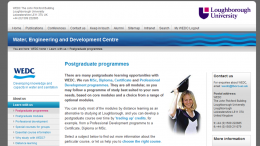



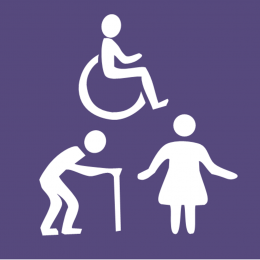

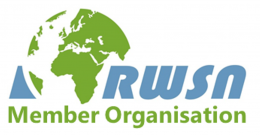

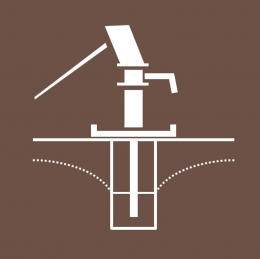

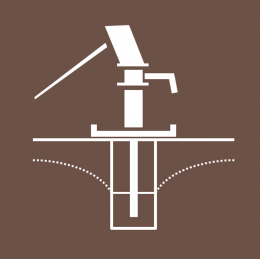
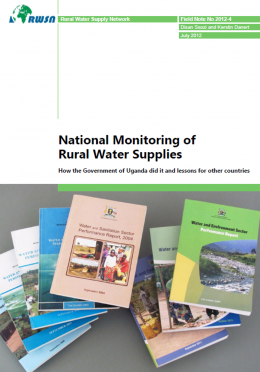
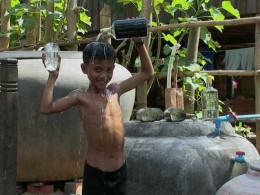
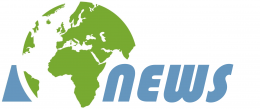

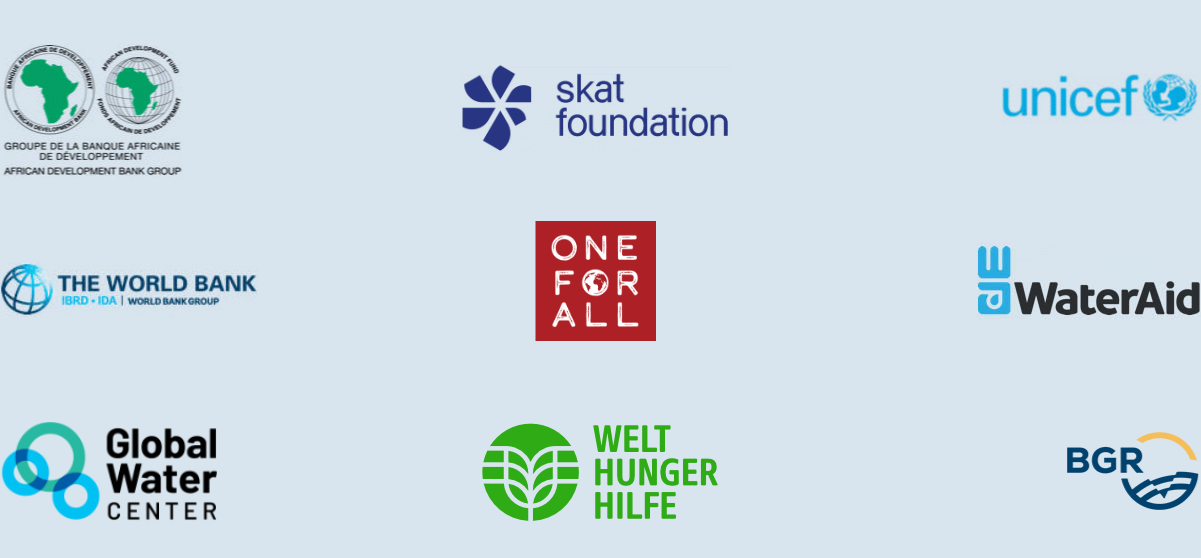





 Google Übersetzer
Google Übersetzer